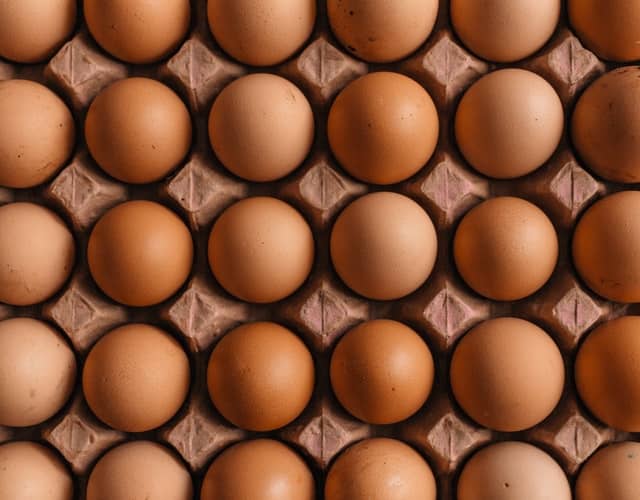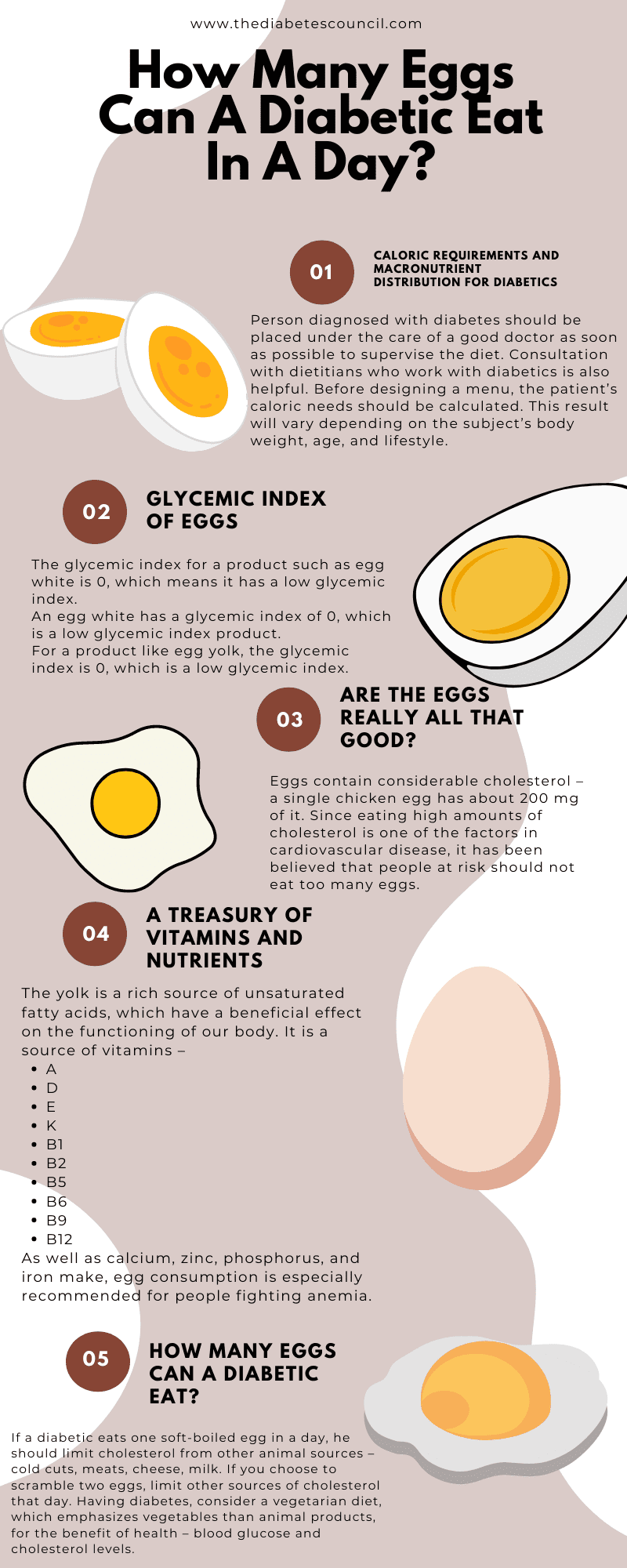
Some foods can raise your blood sugar. But some can lower it. How about eggs? The answer may surprise you. Eggs can be found in our kitchen. Apart from being delicious and many of us love to eat them in various forms, they are an essential ingredient in cakes, custards, mayonnaise, bread, and many other dishes.The question is: can diabetics eat them?
Contents
Caloric requirements and macronutrient distribution for diabetics

Person diagnosed with diabetes should be placed under the care of a good doctor as soon as possible to supervise the diet. Consultation with dietitians who work with diabetics is also helpful. Before designing a menu, the patient's caloric needs should be calculated. This result will vary depending on the subject's body weight, age, and lifestyle.
Especially in the case of type 2 diabetes, the aim of treatment is to help the patient lose weight. More importantly, it will provide a baseline value for dietary design. The diabetic patient should also be informed by the doctor about the required percentage distribution of macronutrients, i.e., proteins, carbohydrates, and fats, in his diet.
The key to staying healthy is essential for people with diabetes in controlling their blood sugar levels. For most healthy people, normal blood sugar levels are 72-108 mg/dL fasting and up to 140 mg/dL 2 hours after eating. It says about 1-2 eggs a day. This amount is safe and allowed. High blood sugar for a too long period leads to serious health complications: it increases the risk of heart, kidney disease, stroke, and vision problems.
Drug treatment is one thing, but diet is no less critical. The high blood sugar levels in people with insulin resistance persist long after the meal is over. Therefore, people struggling with impaired insulin resistance and diabetes (especially type 2) have a difficult task in this area.
Glycemic index of eggs

Eggs possess a low glycemic index and do not affect blood glucose levels. In addition, eggs are a satiating food to reduce caloric intake, which consequently can help improve glycemic control.
The glycemic table divides foods into 3 categories:
- low glycemic index - up to 55
- Medium glycemic index 56-69
- High Glycemic Index 70 and above
The glycemic index for a product such as egg white is 0, which means it has a low glycemic index.
An egg white has a glycemic index of 0, which is a low glycemic index product.
For a product like egg yolk, the glycemic index is 0, which is a low glycemic index.
Scientists believe that eating eggs as part of a healthy and balanced diet does not adversely affect health. Eggs contain a lot of protein and few carbohydrates. They are recommended in the diet of diabetics because they have a low glycemic index. They quickly satisfy hunger and provide a feeling of satiety. They also improve eyesight and protect against eye diseases.
Are the eggs really all that good?

Besides controlling sugar, diabetics must also check their levels of cholesterol. They are in a particular risk group because the abnormal carbohydrate metabolism automatically deteriorates other organs, so the diet must be constantly monitored.
Eggs contain considerable cholesterol - a single chicken egg has about 200 mg of it. Since eating high amounts of cholesterol is one of the factors in cardiovascular disease, it has been believed that people at risk should not eat too many eggs.
However, this theory has now been debunked - it has been found that in addition to cholesterol, eggs also contain lutein, which hinders the absorption of this fat into the blood, making cholesterol from eggs virtually impossible to harm people with hypertension or diabetes.
A treasury of vitamins and nutrients

Eggs, which are still controversial due to cholesterol, are precious. Their unique composition and nutritional value have been appreciated for hundreds of years. Why should we eat one to two eggs a day?
Eggs contain most of the nutrients necessary for the proper functioning of the body. The yolk is a rich source of unsaturated fatty acids, which have a beneficial effect on the functioning of our body. It is a source of vitamins -
- A
- D
- E
- K
- B1
- B2
- B5
- B6
- B9
- B12
As well as calcium, zinc, phosphorus, and iron make, egg consumption is especially recommended for people fighting anemia. Moreover, the yolk is a valuable source of choline, which is a component necessary for the development of the brain, which also has a beneficial effect on our memory.
In the composition of eggs, we can also find lutein and zeaxanthin, antioxidants that reduce the risk of eye diseases (e.g., macular degeneration, cataract). In addition, an egg is rich in high-quality animal protein, which has a beneficial effect on bone health - one egg provides 25% of an adult's daily protein requirement. Studies show that eggs increase satiety, so they play an essential role in weight loss diets. Overflowing with nutrients, they are also low in calories.
Egg protein is a so-called reference protein, i.e., a protein which contains all types of amino acids essential for humans. For infants, breast milk contains the reference protein. For an adult, the reference protein is chicken egg white.
Diabetes and eggs

Diabetes is a disorder that involves abnormal glucose metabolism in the body. When too many simple sugars are consumed, the pancreas produces too little insulin and cannot efficiently convert the excess into energy.
This results in overweight and hyperglycemia, a condition that can be life-threatening for the patient. Therefore, the foods that need to be drastically reduced in the diet are all those foods containing simple sugars and, to some extent, complex sugars.
Can you put an egg in this category? Absolutely not! It consists of mostly protein with a small number of fats and just a trace of carbohydrates. So it is believed that even a few eggs at a time will not significantly raise sugar levels.
How many eggs can a diabetic eat?

They say that a healthy person should consume no more than 300 mg of cholesterol per day. By eating just one egg a day, you leave yourself no room for cholesterol from other sources.
Therefore, although eggs are not a source of carbohydrates and provide many valuable vitamins, minerals, and nutrients such as lutein and choline, they are also full of cholesterol. So it is better not to eat them in excess.
If a diabetic eats one soft-boiled egg in a day, he should limit cholesterol from other animal sources - cold cuts, meats, cheese, milk. If you choose to scramble two eggs, limit other sources of cholesterol that day. Having diabetes, consider a vegetarian diet, which emphasizes vegetables than animal products, for the benefit of health - blood glucose and cholesterol levels.
How to eat eggs if you have diabetes?

Eggs are not as terrible as they are painted! Due to the high protein composition of these delicacies, you can allow yourself to eat them relatively often, but under several conditions:
- use vegetable oil for scrambled eggs, not butter
- avoid adding high-fat products such as bacon or sausage to your eggs
- don't eat them with white bread - choose whole grain bread instead
In diabetes, eggs are not forbidden. In fact, quite the opposite. When combined with whole-grain bread, lots of vegetables, or vegetable fat, eggs can be an essential part of your diet. The idea is to stay satiated for as long as possible without raising blood glucose levels.
It is also a delicious food if you have diabetes and try to lose weight with a diet. So don't be afraid of eggs in diabetes - the only thing that can harm you is the wrong company for them and lack of moderation!
Alternative eggs, how to make?

Vegan "eggs," which are 100% plant-based and, importantly, contain no cholesterol, are an excellent equivalent! Of course, they are a bit more expensive and do not look like regular eggs, but nothing prevents you from getting yourself a box of these once in a while.
Other good alternatives can be crushed banana, peanut butter, chia seeds, or flaxseed. Of course, we're talking about limited amounts here, not, say, half a jar of peanut butter (which is bad for a diabetic). Sometimes you'll have to do a little bit of work, but what's not to do for your health?

Summary

Diabetes does indeed affect lives. After hearing this diagnosis, you may not be able to continue in your profession. Not only does your daily functioning change, but also your diet. What can't diabetics eat? What do you need to get out of your refrigerator? Avoid anything sweetened! We are talking not only about sugar but also honey, sweetened drinks, flavored yogurts with sugar, fruits with high sugar content (such as Orange or bananas), yeast, some pieces of bread, and baked goods.
Eggs are not an obligatory part of the human diet, so there is nothing to stop you if you want to give them up. You can eat eggs, but be careful not only with the quantity but also with the quality. It is worth buying eggs from someone who raises hens on the so-called free range if you have the opportunity. They will not only be tastier but also healthier for you. You need to think for yourself and see how they affect you.





